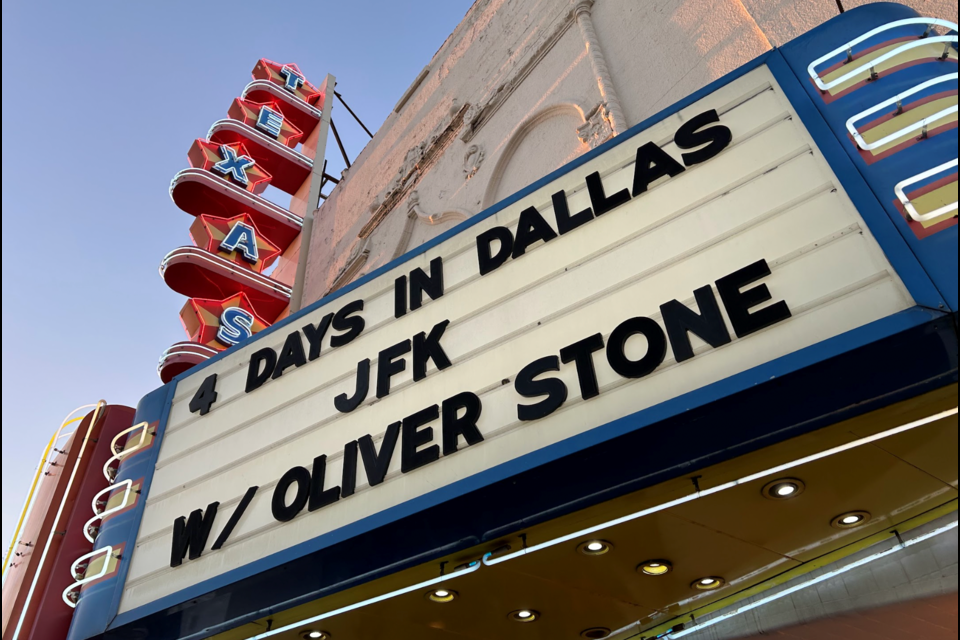I'd always thought my most surreal moviegoing experience was seeing Eyes Wide Shut with Quentin Tarantino's mom on opening weekend. I was wrong.
On Friday, Oct. 4, 2024, JFK was screened at The Texas Theatre where Lee Harvey Oswald was arrested after the assassination of President John F. Kennedy.
"This is where Oswald sat," the person next to me joked before the picture started. It was not. Oswald, apparently, sat further back on the right — among the seats reserved for director Oliver Stone, who was also in attendance.
Downtown Dallas, Stone said during a post-screening Q&A, has changed. But parts of it, such as Dealey Plaza haven't. Stone stayed at The Stoneleigh Hotel while filming JFK in 1991, and I remember that time. (Later that decade, the director returned to Dallas to make the football picture Any Given Sunday. According to Stone, "Jerry Jones very kindly gave us a stadium to work in, because the NFL was adamant against the film, and they tried to make it very difficult for us to shoot.")
As a kid in the early 1990s, JFK, along with Robocop, was one of the few made-in-Dallas movies of which I was aware. Stone got permission to film in a number of Dallas locations, including the Texas Book Depository — though, he had to film on the 7th floor and not the 6th, which, according to Stone, "was the best we could do."
"We closed off Dealey Plaza," said Stone. "We got the permission from the board. It was a very close vote, three to two. And we didn't buy anybody off." The director described Dealey Plaza as a "jewel box," adding that it should be a national monument.
"It should be preserved," said Stone. "But there are people in this town who want to bury the past and cover it all up. So they put up a museum, which pretends to pay homage to the truth, but we know is not accurate at all."
Not every real-life location was used. JFK didn't film at Parkland Hospital, for example, where Kennedy was brought after the assassination, and instead, doubled it with St Joseph’s Hospital in Fort Worth. My mom worked at Parkland, and whenever I'd go with her, we'd pass the ER entrance where Kennedy's black limo had parked on that November day in 1963. Her boss would tell us that the back had been strewn with the roses Jackie carried, and there was a search among Parkland employees for matching donors, even as chances already seemed hopeless.
For much of my childhood during the 1980s, that history seemed tangible. Somebody always knew someone who was there that day. Or, as I found out again while in line for snacks last Friday night, somebody always knew someone. "I was friends with Officer Tippet's son, Alan," said the man in front of me, waiting to buy popcorn with his Australian shepherd. "We went to school together."
After Officer Tippet's murder, Oswald was arrested at The Texas Theatre. In the movie, Gary Oldman as Lee Harvey Oswald is carted out of the theater. As we sat in the theater, watching the scene unfold, history came into sharp focus. It happened. Right here.
Then, Oldman is shown sitting in a seat, several rows back, and I could feel people turn around, looking to see where in the theater that was. We watched in JFK as the Korean war movie War Is Hell was projected on the Texas Theatre screen in — as JFK was projected on the screen at The Texas Theatre.
This is the closest I've had to a movie out-of body experience. I couldn't think of another of something like this in cinematic— and American — history.
"It was like being in an M.C. Escher drawing," a friend said after the movie.
The whole thing was even more surreal when the man who made it, Oliver Stone, got up on stage and talked about the picture. I remember the controversy when JFK was originally released. The movie challenged the official line. "There was a lot of attacks, ad hominem attacks," said Stone. "I felt really like I crossed over the Rubicon. I was the enemy." JFK holds up — maybe not as a piece of historical scholarship — but it captures a mood and a paranoia that people felt and still feel.
Now 78, Stone recently released the first of his memoirs, Chasing The Light. "I'd like to try to do that (another volume of his memoirs)," Stone said at the end of his talk. "I'd also like to try to do another film."
Don't miss anything Local. Sign up for our free newsletter.




